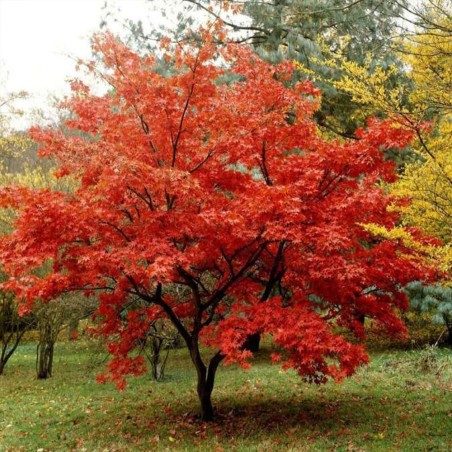






Acer ginnala, known as the Amur maple (also called the maple of love due to the phonetic similarity), is a small tree or shrub native to Asia. It has a compact growth habit, reaching between 3 and 6 meters in height. Its green leaves turn a deep red in autumn, and it produces small yellow flowers. It is cold-hardy and widely used as an ornamental plant in gardens and landscaping projects.
Acer ginnala, commonly known as the Amur maple and affectionately referred to as the maple of love due to the phonetic similarity between "Amur" and "amor", is a small deciduous tree or shrub native to northeastern Asia, particularly regions such as Manchuria, Korea, and the Amur River area between Russia and China. This species is highly valued in ornamental gardening as well as in the art of bonsai, thanks to its elegant form, hardiness, and spectacular autumn color.
This maple reaches a height of 3 to 6 meters, with a compact and branched structure that makes it ideal for small gardens or as a decorative hedge. Its leaves are three-lobed, bright green in spring and summer, and turn vivid shades of red, orange, or scarlet in the fall, offering a striking visual display. In early spring, before the leaves emerge, it produces small creamy-yellow flowers in clusters—modest in appearance but an important source of nectar for pollinating insects.
One of the standout features of Acer ginnala is its notable cold hardiness, which makes it suitable for cultivation in temperate and continental climates. It adapts well to various soil types, as long as they are well-drained, and prefers sunny or partially shaded locations.
Thanks to its manageable size, attractive trunk, and moderate growth rate, the Amur maple is very popular among bonsai enthusiasts. It responds well to pruning and wiring, and its ability to develop fine branching, along with its beautiful autumn foliage, makes it an excellent choice for both beginners and experienced growers. It is also quite resilient and tolerates container growing well, provided watering is carefully managed and the roots are protected from severe frost.

| January | February | March | April | May | June | July | August | September | October | November | December |
Data sheet
No customer questions for the moment.